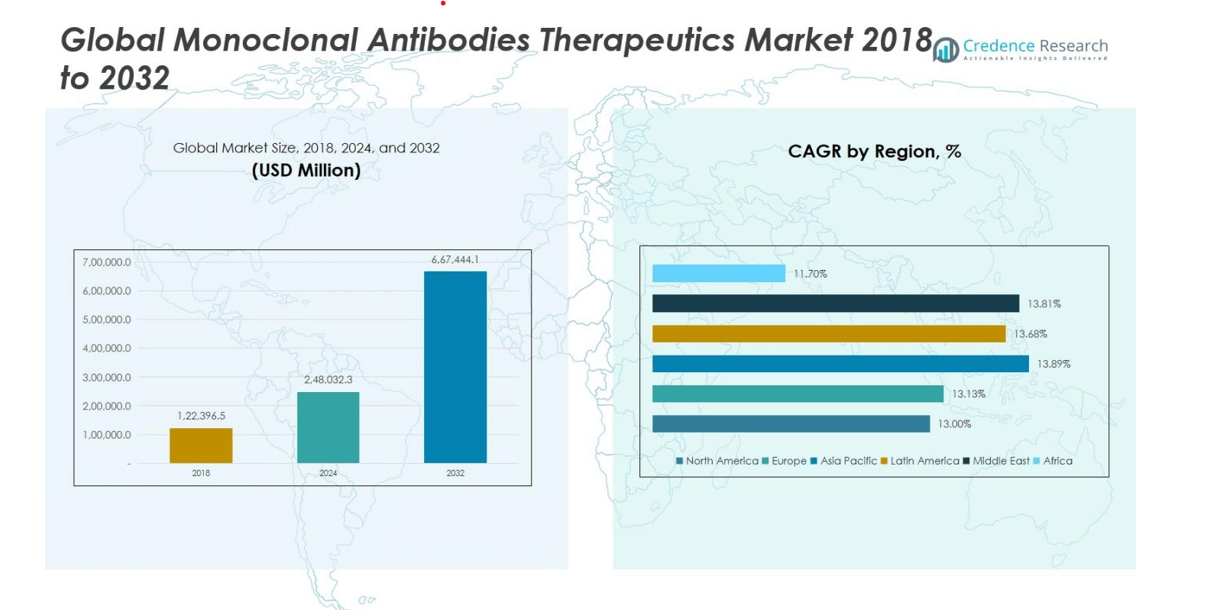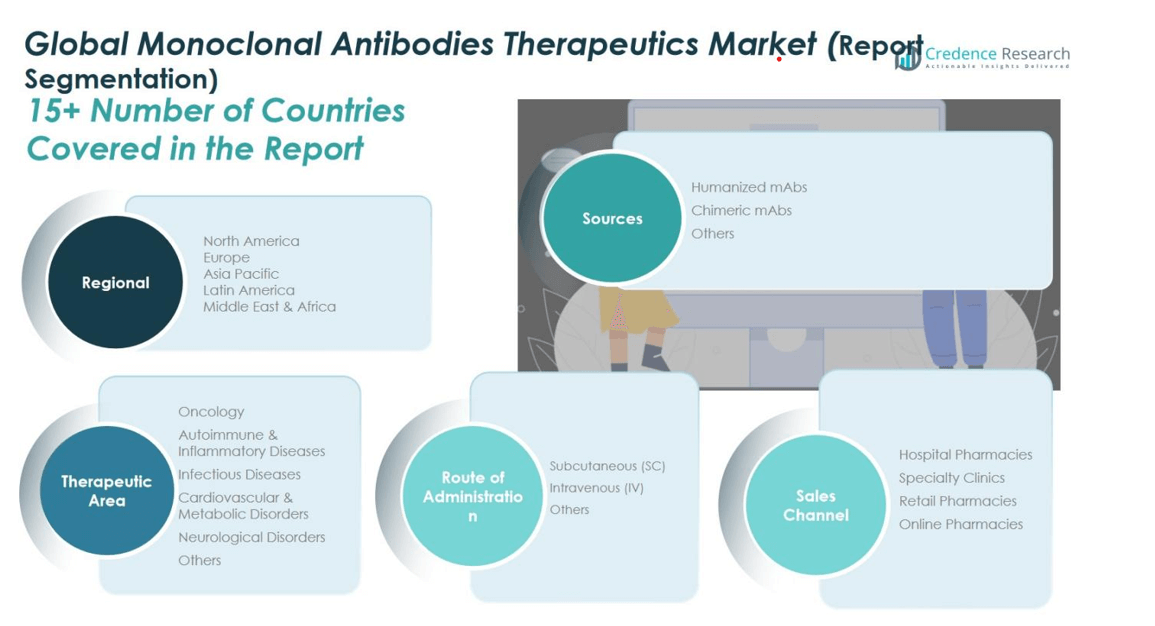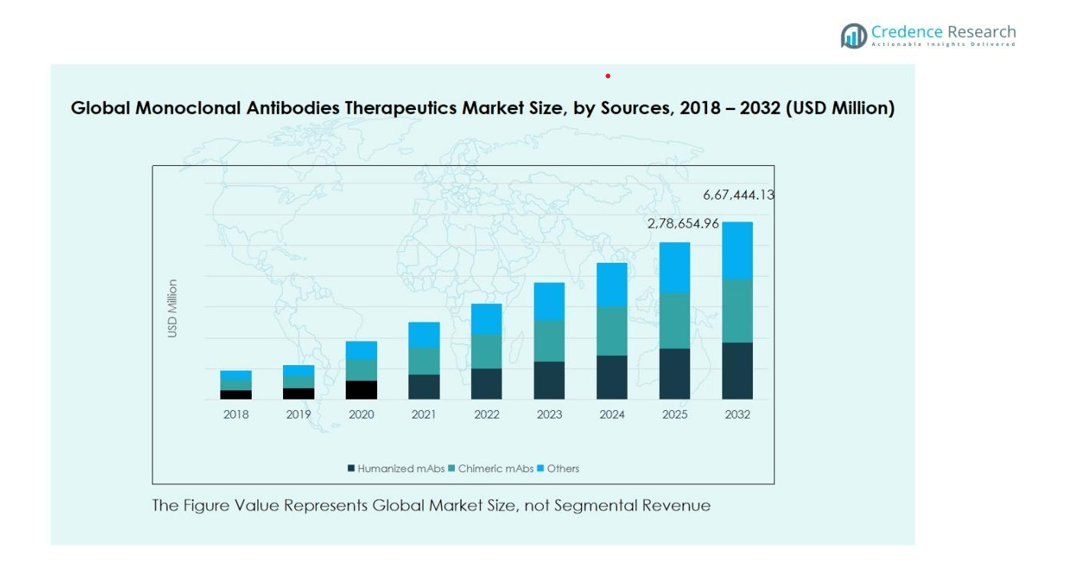CHAPTER NO. 1 : GENESIS OF THE MARKET
1.1 Market Prelude – Introduction & Scope
1.2 The Big Picture – Objectives & Vision
1.3 Strategic Edge – Unique Value Proposition
1.4 Stakeholder Compass – Key Beneficiaries
CHAPTER NO. 2 : EXECUTIVE LENS
2.1 Pulse of the Industry – Market Snapshot
2.2 Growth Arc – Revenue Projections (USD Million)
2.3. Premium Insights – Based on Primary Interviews
CHAPTER NO. 3 : MONOCLONAL ANTIBODIES THERAPEUTICS MARKET FORCES & INDUSTRY PULSE
3.1 Foundations of Change – Market Overview
3.2 Catalysts of Expansion – Key Market Drivers
3.2.1 Momentum Boosters – Growth Triggers
3.2.2 Innovation Fuel – Disruptive Technologies
3.3 Headwinds & Crosswinds – Market Restraints
3.3.1 Regulatory Tides – Compliance Challenges
3.3.2 Economic Frictions – Inflationary Pressures
3.4 Untapped Horizons – Growth Potential & Opportunities
3.5 Strategic Navigation – Industry Frameworks
3.5.1 Market Equilibrium – Porter’s Five Forces
3.5.2 Ecosystem Dynamics – Value Chain Analysis
3.5.3 Macro Forces – PESTEL Breakdown
CHAPTER NO. 4 : KEY INVESTMENT EPICENTER
4.1 Regional Goldmines – High-Growth Geographies
4.2 Product Frontiers – Lucrative Sources Categories
4.3 Therapeutic Area Sweet Spots – Emerging Demand Segments
CHAPTER NO. 5: REVENUE TRAJECTORY & WEALTH MAPPING
5.1 Momentum Metrics – Forecast & Growth Curves
5.2 Regional Revenue Footprint – Market Share Insights
5.3 Segmental Wealth Flow – Sources, Therapeutic Area, Route of Administration, & Sales Channel Revenue
CHAPTER NO. 6 : TRADE & COMMERCE ANALYSIS
6.1. Import Analysis By Region
6.1.1. Global Monoclonal Antibodies Therapeutics Market Import Revenue By Region
6.2. Export Analysis By Region
6.2.1. Global Monoclonal Antibodies Therapeutics Market Export Revenue By Region
CHAPTER NO. 7 : COMPETITION ANALYSIS
7.1. Company Market Share Analysis
7.1.1. Global Monoclonal Antibodies Therapeutics Market: Company Market Share
7.2. Global Monoclonal Antibodies Therapeutics Market Company Revenue Market Share
7.3. Strategic Developments
7.3.1. Acquisitions & Mergers
7.3.2. New Product Launch
7.3.3. Regional Expansion
7.4. Competitive Dashboard
7.5. Company Assessment Metrics, 2024
CHAPTER NO. 8 : MONOCLONAL ANTIBODIES THERAPEUTICS MARKET – BY SOURCES SEGMENT ANALYSIS
8.1. Monoclonal Antibodies Therapeutics Market Overview By Sources Segment
8.1.1. Monoclonal Antibodies Therapeutics Market Revenue Share By Sources
8.2. Humanized mAbs
8.3. Chimeric mAbs
8.4. Others
CHAPTER NO. 9 : MONOCLONAL ANTIBODIES THERAPEUTICS MARKET – BY THERAPEUTIC AREA SEGMENT ANALYSIS
9.1. Monoclonal Antibodies Therapeutics Market Overview By Therapeutic Area Segment
9.1.1. Monoclonal Antibodies Therapeutics Market Revenue Share By Therapeutic Area
9.2. Oncology
9.3. Autoimmune & Inflammatory Diseases
9.4. Infectious Diseases
9.5. Cardiovascular & Metabolic Disorders
9.6. Neurological Disorders
9.7. Others
CHAPTER NO. 10 : MONOCLONAL ANTIBODIES THERAPEUTICS MARKET – BY ROUTE OF ADMINISTRATION SEGMENT ANALYSIS
10.1. Monoclonal Antibodies Therapeutics Market Overview By Route of Administration Segment
10.1.1. Monoclonal Antibodies Therapeutics Market Revenue Share By Route of Administration
10.2. Subcutaneous (SC)
10.3. Intravenous (IV)
10.4. Others
CHAPTER NO. 11 : MONOCLONAL ANTIBODIES THERAPEUTICS MARKET – BY SALES CHANNEL SEGMENT ANALYSIS
11.1. Monoclonal Antibodies Therapeutics Market Overview By Sales Channel Segment
11.1.1. Monoclonal Antibodies Therapeutics Market Revenue Share By Sales Channel
11.2. Hospital Pharmacies
11.3. Specialty Clinics
11.4. Retail Pharmacies
11.5. Online Pharmacies
CHAPTER NO. 12 : MONOCLONAL ANTIBODIES THERAPEUTICS MARKET – REGIONAL ANALYSIS
12.1. Monoclonal Antibodies Therapeutics Market Overview By Region Segment
12.1.1. Global Monoclonal Antibodies Therapeutics Market Revenue Share By Region
12.1.2. Regions
12.1.3. Global Monoclonal Antibodies Therapeutics Market Revenue By Region
12.1.4. Sources
12.1.5. Global Monoclonal Antibodies Therapeutics Market Revenue By Sources
12.1.6. Therapeutic Area
12.1.7. Global Monoclonal Antibodies Therapeutics Market Revenue By Therapeutic Area
12.1.8. Route of Administration
12.1.9. Global Monoclonal Antibodies Therapeutics Market Revenue By Route of Administration
12.1.10. Sales Channel
12.1.11. Global Monoclonal Antibodies Therapeutics Market Revenue By Sales Channel
CHAPTER NO. 13 : NORTH AMERICA MONOCLONAL ANTIBODIES THERAPEUTICS MARKET – COUNTRY ANALYSIS
13.1. North America Monoclonal Antibodies Therapeutics Market Overview By Country Segment
13.1.1. North America Monoclonal Antibodies Therapeutics Market Revenue Share By Region
13.2. North America
13.2.1. North America Monoclonal Antibodies Therapeutics Market Revenue By Country
13.2.2. Sources
13.2.3. North America Monoclonal Antibodies Therapeutics Market Revenue By Sources
13.2.4. Therapeutic Area
13.2.5. North America Monoclonal Antibodies Therapeutics Market Revenue By Therapeutic Area
13.2.6. Route of Administration
13.2.7. North America Monoclonal Antibodies Therapeutics Market Revenue By Route of Administration
13.2.8. Sales Channel
13.2.9. North America Monoclonal Antibodies Therapeutics Market Revenue By Sales Channel
13.3. U.S.
13.4. Canada
13.5. Mexico
CHAPTER NO. 14 : EUROPE MONOCLONAL ANTIBODIES THERAPEUTICS MARKET – COUNTRY ANALYSIS
14.1. Europe Monoclonal Antibodies Therapeutics Market Overview By Country Segment
14.1.1. Europe Monoclonal Antibodies Therapeutics Market Revenue Share By Region
14.2. Europe
14.2.1. Europe Monoclonal Antibodies Therapeutics Market Revenue By Country
14.2.2. Sources
14.2.3. Europe Monoclonal Antibodies Therapeutics Market Revenue By Sources
14.2.4. Therapeutic Area
14.2.5. Europe Monoclonal Antibodies Therapeutics Market Revenue By Therapeutic Area
14.2.6. Route of Administration
14.2.7. Europe Monoclonal Antibodies Therapeutics Market Revenue By Route of Administration
14.2.8. Sales Channel
14.2.9. Europe Monoclonal Antibodies Therapeutics Market Revenue By Sales Channel
14.3. UK
14.4. France
14.5. Germany
14.6. Italy
14.7. Spain
14.8. Russia
14.9. Rest of Europe
CHAPTER NO. 15 : ASIA PACIFIC MONOCLONAL ANTIBODIES THERAPEUTICS MARKET – COUNTRY ANALYSIS
15.1. Asia Pacific Monoclonal Antibodies Therapeutics Market Overview By Country Segment
15.1.1. Asia Pacific Monoclonal Antibodies Therapeutics Market Revenue Share By Region
15.2. Asia Pacific
15.2.1. Asia Pacific Monoclonal Antibodies Therapeutics Market Revenue By Country
15.2.2. Sources
15.2.3. Asia Pacific Monoclonal Antibodies Therapeutics Market Revenue By Sources
15.2.4. Therapeutic Area
15.2.5. Asia Pacific Monoclonal Antibodies Therapeutics Market Revenue By Therapeutic Area
15.2.6. Route of Administration
15.2.7. Asia Pacific Monoclonal Antibodies Therapeutics Market Revenue By Route of Administration
15.2.8. Sales Channel
15.2.9. Asia Pacific Monoclonal Antibodies Therapeutics Market Revenue By Sales Channel
15.3. China
15.4. Japan
15.5. South Korea
15.6. India
15.7. Australia
15.8. Southeast Asia
15.9. Rest of Asia Pacific
CHAPTER NO. 16 : LATIN AMERICA MONOCLONAL ANTIBODIES THERAPEUTICS MARKET – COUNTRY ANALYSIS
16.1. Latin America Monoclonal Antibodies Therapeutics Market Overview By Country Segment
16.1.1. Latin America Monoclonal Antibodies Therapeutics Market Revenue Share By Region
16.2. Latin America
16.2.1. Latin America Monoclonal Antibodies Therapeutics Market Revenue By Country
16.2.2. Sources
16.2.3. Latin America Monoclonal Antibodies Therapeutics Market Revenue By Sources
16.2.4. Therapeutic Area
16.2.5. Latin America Monoclonal Antibodies Therapeutics Market Revenue By Therapeutic Area
16.2.6. Route of Administration
16.2.7. Latin America Monoclonal Antibodies Therapeutics Market Revenue By Route of Administration
16.2.8. Sales Channel
16.2.9. Latin America Monoclonal Antibodies Therapeutics Market Revenue By Sales Channel
16.3. Brazil
16.4. Argentina
16.5. Rest of Latin America
CHAPTER NO. 17 : MIDDLE EAST MONOCLONAL ANTIBODIES THERAPEUTICS MARKET – COUNTRY ANALYSIS
17.1. Middle East Monoclonal Antibodies Therapeutics Market Overview By Country Segment
17.1.1. Middle East Monoclonal Antibodies Therapeutics Market Revenue Share By Region
17.2. Middle East
17.2.1. Middle East Monoclonal Antibodies Therapeutics Market Revenue By Country
17.2.2. Sources
17.2.3. Middle East Monoclonal Antibodies Therapeutics Market Revenue By Sources
17.2.4. Therapeutic Area
17.2.5. Middle East Monoclonal Antibodies Therapeutics Market Revenue By Therapeutic Area
17.2.6. Route of Administration
17.2.7. Middle East Monoclonal Antibodies Therapeutics Market Revenue By Route of Administration
17.2.8. Sales Channel
17.2.9. Middle East Monoclonal Antibodies Therapeutics Market Revenue By Sales Channel
17.3. GCC Countries
17.4. Israel
17.5. Turkey
17.6. Rest of Middle East
CHAPTER NO. 18 : AFRICA MONOCLONAL ANTIBODIES THERAPEUTICS MARKET – COUNTRY ANALYSIS
18.1. Africa Monoclonal Antibodies Therapeutics Market Overview By Country Segment
18.1.1. Africa Monoclonal Antibodies Therapeutics Market Revenue Share By Region
18.2. Africa
18.2.1. Africa Monoclonal Antibodies Therapeutics Market Revenue By Country
18.2.2. Sources
18.2.3. Africa Monoclonal Antibodies Therapeutics Market Revenue By Sources
18.2.4. Therapeutic Area
18.2.5. Africa Monoclonal Antibodies Therapeutics Market Revenue By Therapeutic Area
18.2.6. Route of Administration
18.2.7. Africa Monoclonal Antibodies Therapeutics Market Revenue By Route of Administration
18.2.8. Sales Channel
18.2.9. Africa Monoclonal Antibodies Therapeutics Market Revenue By Sales Channel
18.3. South Africa
18.4. Egypt
18.5. Rest of Africa
CHAPTER NO. 19 : COMPANY PROFILES
19.1. F. Hoffmann-La Roche Ltd
19.1.1. Company Overview
19.1.2. Product Portfolio
19.1.3. Financial Overview
19.1.4. Recent Developments
19.1.5. Growth Strategy
19.1.6. SWOT Analysis
19.2. Sanofi
19.3. Abbvie Inc.
19.4. Bristol Myers Squibb Company
19.5. Novartis AG
19.6. AstraZeneca
19.7. Amgen Inc.
19.8. Eli Lilly and Company
19.9. Takeda Pharmaceutical Company Limited
19.10. Johnson & Johnson Services, Inc.
19.11. Other Key Players






